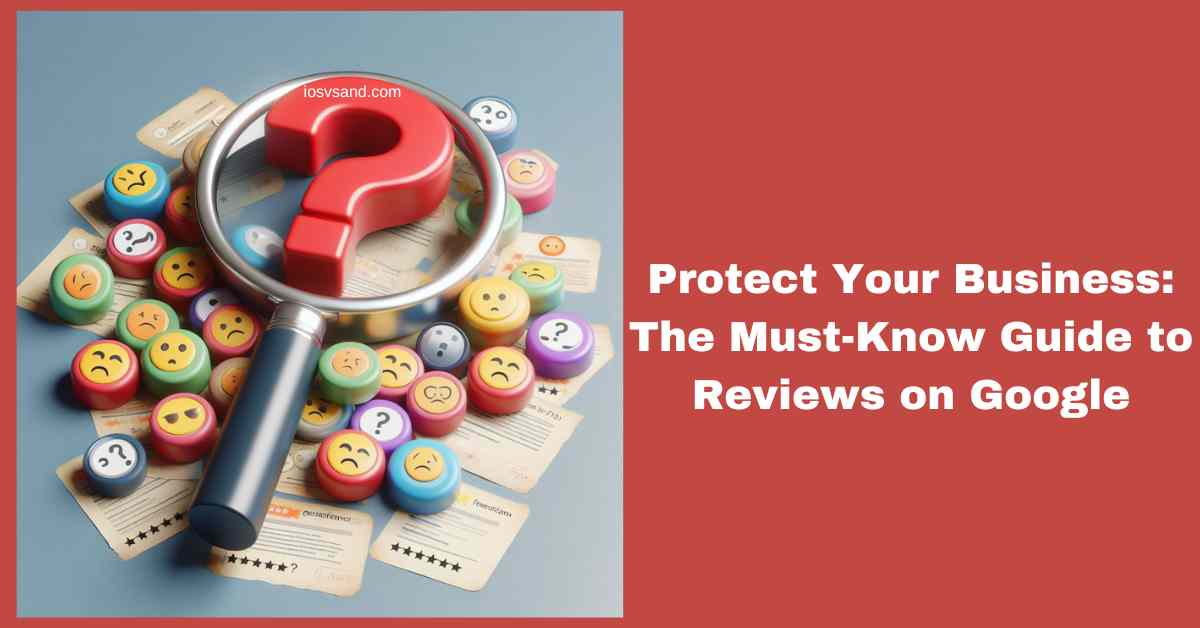CTRL+ALT+DELETE Your 9-to-5 Ever wished your SIDE HUSTLE could run on AUTOPILOT? AI is making…

Reviews on Google: The Must-Know Guide to Protect Your Business
- Cracking the Code of Reviews on Google: Spotting Fakes to Win Big
- Telltale Signs of Fake Google Reviews
- Protect Your Business from Fake Reviews
- The Importance of Authenticity
- Conclusion:
- FAQs
- How can I safeguard my business from future fake review attacks?
- What can I do if I get a fake negative review on Google?
- How does Google’s algorithm try to detect fake reviews?
- Can fake Google reviews hurt my business?
- Is it illegal to buy fake positive Google reviews?
- Should I publicly call out reviews I think are fake?
- Can fake reviews help my business in the short term?
- Does the problem of fake reviews only affect businesses?
- With fake reviews out there, can I even trust online reviews anymore?
- Besides Google, where else can I report suspected fake reviews?
- How can I spot businesses potentially manipulating their reviews?
Cracking the Code of Reviews on Google: Spotting Fakes to Win Big
Did you know that most consumers trust online reviews as much as recommendations from friends and family? Unfortunately, a growing portion of these reviews are fake, designed to manipulate your opinion.
The world of reviews on Google has become a minefield of deception. Fake reviews can seriously hurt businesses by misleading consumers and damaging reputations.
Fake reviews come in many forms. They might be overly positive reviews purchased by the business itself or malicious negative reviews planted by competitors. Sometimes, they’re just the work of internet trolls seeking to stir up drama.
Don’t worry! This guide will help you develop a keen eye for fake Google reviews. You’ll learn the telltale signs of manufactured feedback and, as a result, be able to protect your business or make better-informed choices as a consumer.
To drive the point home, let’s dive deeper into those fake review red flags with examples.
Telltale Signs of Fake Google Reviews
Spotting fake reviews doesn’t require you to be Sherlock Holmes, but it does need an attentive eye. Look out for these key warning signs:
Generic Language and Lack of Specifics:
Real people rave about the buttery croissant they ate or the incredibly helpful store associate. Fake reviews tend to sound vague and overly promotional, using phrases like “great service” or “highly recommend” without providing any concrete details about their experience.
Example: “This restaurant is amazing! Best food ever!” vs. “Their mushroom ravioli was perfectly cooked, and the tiramisu was to die for!”
Awkward Grammar and Unnatural Phrasing:
It’s not always perfect grammar that marks a fake review. The wording may be clunky or stilted if English isn’t the writer’s primary language. Look for unusual turns of phrase and sentence structures that feel “off.”
Example: “Service very fast, product arrive good condition.” vs. “My package arrived quickly, and everything was in excellent condition.”
Review Timing:
A sudden influx of rave reviews in a short time frame – especially for a new business – is suspicious. Similarly, if several reviews are clustered suspiciously closely, this could indicate artificial inflation. Tools like ReviewMeta (<invalid URL removed>) can help analyze review patterns.
Extreme Reviews:
A few negative reviews among a sea of positive ones are normal. But if a business appears to have an overwhelming number of either all 5-star or all 1-star reviews, with little in between, tread carefully.
Example: Imagine a coffee shop with twenty reviews: 17 are gushing 5-stars, 3 are scathing 1-stars, and there’s nothing in the middle.
Lack of Reviewer History:
Look at the user profile of the reviewer. Do they mostly review a singular type of business (i.e., only restaurants)? Have they left an unusually high number of reviews in a short timeframe? Sparse reviewer histories suggest they may be inauthentic.
Stock Photos or Generic Usernames:
Fake reviewers often hide behind stock photos instead of personalized profile pictures. Usernames that are a jumble of numbers and letters rather than real names are another red flag.
Overly Promotional or Competitive Language:
Real reviewers focus on their own experience. Be wary of reviews that sound like advertisements or directly compare to a competitor (this could be a malicious attack).
Example: “The best pizza in town, way better than [Competitor’s Name]!”
Copy-Pasted Reviews:
Sometimes, fake reviews are recycled. If you see the same review or very similar wording for multiple businesses, it’s a near-guaranteed sign of fraud.
Irrelevant details or focus on non-core aspects:
A review of a restaurant that mostly complains about the parking situation or a software review that fixates on the brand’s website rather than the software itself could be trying to distract from the real quality of the product or service.
Reviews lacking verified purchase indicators:
Some platforms, including Google, may offer “verified purchase” badges. The absence of these badges (when applicable) doesn’t automatically prove a review is fake, but it’s something to consider.
Absolutely! Here’s the expanded table with several more red flags to spot fake reviews:
Red Flags of Fake Reviews
| Feature | Fake Review Example | Real Review Example |
|---|---|---|
| Language | “Amazing service! Best ever!” | “The barista was friendly and recommended a delicious oat milk latte – definitely coming back!” |
| Reviewer History | A cluster of 5-star reviews within a few days for a new business | Reviews a variety of businesses (restaurants, stores, services, etc.) |
| Review Timing | “The barista was friendly and recommended a delicious oat milk latte – coming back!” | Positive and negative reviews spread realistically over time |
| Extreme Opinions | All 5-star gushing praise, OR scathing 1-star with no nuance | “Good food, but service was a bit slow” (example of a mixed review) |
| Profile Clues | Stock photo or generic username | Personalized profile picture, real-sounding username |
| Focus | Sounds like an ad, or directly attacks a competitor | Focuses on their specific experience, even when negative (“Wait time was long, BUT food was worth it”) |
| Copy-Pasted | Identical or near-identical review on multiple business pages | |
| Irrelevance | Fixates on minor details unrelated to core offering (e.g., bad parking at a great restaurant) | It is filled with exaggerated outrage or extreme praise that feels staged |
| Overly Emotional | Filled with exaggerated outrage or extreme praise that feels staged | Reviews use more measured language, even when upset/enthusiastic |
| Inconsistencies | Review contradicts known facts (mentions staff who don’t exist, etc.) | Review details align with what’s verifiable about the business |
| Reviewer Incentives | Mentions being offered discounts/freebies in exchange for reviews |
Protect Your Business from Fake Reviews
Getting hit with fake reviews is incredibly frustrating. Here’s how to fight back and minimize the damage:
Encourage Real Reviews:
The best defense against fake reviews is a flood of genuine ones. Make it easy for satisfied customers to leave their feedback. Provide QR codes to your Google review page, include links in follow-up emails, and consider incentivizing honest reviews (within Google’s guidelines).
Respond to Negative Reviews Professionally:
Even legitimate bad reviews present an opportunity. Address concerns calmly, offer solutions where possible, and show you care about customer experiences. This indicates to other readers that you’re trustworthy, even if not everyone is always happy.
Consider Polite Responses to Suspicious Reviews:
Sometimes, calling out a likely fake review publicly can be strategic. Without accusing outright, point out inconsistencies or generic phrasing tactfully. For example: “Thank you for the feedback. We have no record of you as a customer; are you sure you have the right business?” This may discourage future fake reviews.
Report Fake Reviews to Google:
Google does have systems for removing reviews that violate their guidelines (https://support.google.com/business/answer/4596773). Explain why you believe a review is fake and provide any evidence. It’s not guaranteed, but persistence can pay off.
Legal Options (in Extreme Cases):
Legal action may be the last resort if a competitor orchestrates malicious fake reviews. Consult a lawyer who specializes in online reputation management. However, legal battles are costly and time-consuming, so use them sparingly.
The Importance of Authenticity
In a world of online noise, seeking authenticity is more important than ever. Here’s why genuine reviews on Google matter:
Consumer Trust:
Fake reviews breed cynicism. Studies show that most consumers distrust a business if they suspect review manipulation. Honesty fosters a bond between businesses and their customers.
Impact on Search Results:
While Google’s algorithms are sophisticated, they’re not infallible. An established pattern of suspicious review activity could hurt a business’s visibility in search results. In contrast, providing reliable feedback helps consumers find quality businesses.
Ethical Business Practices:
Resorting to fake reviews is ultimately a losing strategy. Businesses built on integrity and a customer-first approach see more significant long-term success. A transparent online presence attracts not only consumers but also top talent and reputable business partners.
Conclusion:
Fake reviews are a common problem. Remember the warning signs like vague language, unnatural phrasing, suspicious review timing, and lack of reviewer history.
Be proactive about monitoring your reviews on Google. Encourage legitimate customer feedback, respond thoughtfully to all reviews (positive and negative), and report suspected fakes to Google.
Don’t blindly trust everything you read online. Look for businesses with a consistent pattern of positive reviews and those that address concerns raised by past customers.
Integrity is more valuable than ever in a world saturated with online information. Businesses focusing on customer satisfaction and consumers who do their due diligence help create a fairer and more transparent online ecosystem. As Google refines its algorithms, businesses relying on fake reviews will become increasingly left behind.
FAQs
How can I safeguard my business from future fake review attacks?
Unfortunately, there’s no foolproof way to stop fake reviews entirely. However, a proactive approach significantly reduces their impact:
Encourage authentic reviews: Make it easy for satisfied customers to review you (QR codes, email follow-ups). Positive reviews drown out fakes.
Monitor your reviews regularly: Set up Google Alerts for your business name and check review sites frequently. Early detection is key.
Respond thoughtfully to all reviews: Address negative reviews professionally. Demonstrate that you care about customer experience.
Report fakes to the platform: Follow Google’s (or the platform’s) guidelines for reporting suspicious reviews.
Don’t engage in review manipulation yourself: It’s a short-sighted tactic that ultimately backfires. Focus on delivering great experiences that earn genuine praise.
What can I do if I get a fake negative review on Google?
Don’t panic! Here’s a measured approach:
Assess: Is it simply a disgruntled customer or a truly suspicious review?
Respond professionally: Even if you believe the review is fake, address it calmly and offer to try to address any concerns. This shows other readers you care.
Report to Google: If the review violates Google’s guidelines, flag it. Don’t expect immediate removal, but be persistent.
Encourage real reviews: Proactively ask happy customers to leave their feedback to drown out any fakes.
How does Google’s algorithm try to detect fake reviews?
Google doesn’t reveal its exact methods, which helps them stay ahead of those trying to game the system. However, they likely look for patterns such as:
Review spikes: Sudden bursts of activity that seem unnatural.
Reviewer habits: Reviewers leave suspicious numbers of reviews on unrelated businesses.
IP addresses and device identifiers: Clusters of reviews originating from the same location or device could be flagged.
Language Analysis: AI can assist in detecting fake sentiment patterns
Can fake Google reviews hurt my business?
Absolutely. Fake reviews, both negative and overly positive, erode trust. Consumers increasingly see through misleading reviews. Negative fake reviews can directly hurt your reputation, while fake positive reviews can damage your credibility if discovered.
Is it illegal to buy fake positive Google reviews?
While the direct legal consequences vary by location, buying fake reviews is highly unethical and violates Google’s policies. Businesses caught doing so risk having reviews removed and potentially face search ranking penalties. Providing great experiences and earning authentic reviews is always the better long-term strategy.
Should I publicly call out reviews I think are fake?
This is a judgment call. Sometimes, a polite, non-accusatory response highlighting inconsistencies in a review can discourage similar future occurrences. However, aggressive responses can backfire if you misjudge and the review is legitimate. Use this tactic in situations where the evidence seems strongly in your favor.
Can fake reviews help my business in the short term?
While initially tempting, the risks far outweigh any short-term gains. Consumers are savvy to review manipulation. Getting caught means a loss of reputation, which is incredibly hard to rebuild. Plus, if a fake review pattern is detected, Google may penalize your rankings. Sustainable businesses are built on honest customer experiences.
Does the problem of fake reviews only affect businesses?
No. Fake reviews mislead consumers and make it harder for them to make informed choices. They’re detrimental to the fairness of the online marketplace as a whole. Everyone has a role to play in reporting suspicious reviews and prioritizing trustworthy sources of information.
With fake reviews out there, can I even trust online reviews anymore?
It’s understandable to be wary. Rather than abandoning reviews altogether, approach them with healthy skepticism. Look for businesses with a consistent history of diverse reviews. Focus on reviewers with established profiles and prioritize those who mention specific details. It’s still possible to use reviews wisely while being mindful of manipulation.
Besides Google, where else can I report suspected fake reviews?
Raising awareness about fake reviews helps the entire marketplace. Here are additional reporting options:
Better Business Bureau (BBB): The BBB combats marketplace fraud, including fake reviews. File a complaint on their website.
Federal Trade Commission (FTC): If you see clear patterns of review manipulation across a network, consider reporting to the FTC (https://reportfraud.ftc.gov/)
Review-Specific Sites: Sites like Yelp often have their own reporting processes for suspected fake reviews.
Consumer Watchdog Sites: Look for local or industry-specific watchdog organizations collecting data on fake review patterns.
How can I spot businesses potentially manipulating their reviews?
Savvy consumers can help weed out businesses engaging in shady tactics. Look for red flags like:
All overly positive reviews: A mix of review scores is natural. Be wary of businesses with only 5-star reviews, especially if they are brief and generic.
Suspicious time clusters: A surge of glowing reviews posted within a short period, particularly for a new business, is a giveaway.
Lack of review diversity: When every reviewer leaves the same number of stars and uses similar language, it suggests manipulation.
Reviewer red flags: Check profiles of reviewers giving glowing praise. Sparse histories or those who predominantly review only a few businesses are suspect.
Important: Suspicion doesn’t equal proof. Don’t accuse businesses directly, but use these signs to guide your decisions on where to spend your money as a consumer.



